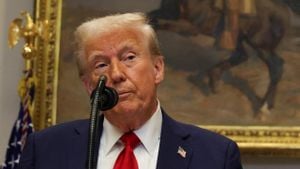Russia's pension system is set for significant changes beginning 2025, with reforms aimed at tightening eligibility requirements for individuals entering retirement.
New regulations will establish stringent criteria for the calculation of the individual pension coefficient—a measure used to determine pension payouts. According to sources, the minimum requirement will be set at 30, remaining unchanged thereafter. This marks a shift from previous practices where coefficients could fluctuate, instead providing future retirees with clear parameters from the outset of their careers.
"This fixity is intended to provide stability for the pension framework, but it also may limit the benefits for some individuals depending on their work history and earnings contributions," described Igor Balynin, associate professor at Russia's Financial University.
Under the legislation, the minimum work record needed to qualify for the insurance pension will hold steady at 15 years. This stipulation means individuals won't be able to accrue additional service time for earlier retirement, which had been part of the gradual increases to the retirement age previously implemented.
For many Russians, especially women born after 1966 and men born after 1961, these new rules apply on standard retirement benches, making retirement planning more straightforward yet potentially less flexible than before.
Balynin noted, "The recent changes seem aimed at simplifying the eligibility process, but they also reflect broader economic policies as the government responds to inflation concerns. The upcoming adjustments are not just bureaucratic, but are tied directly to the practicalities of living costs.”
The amendments to the pension framework come against the backdrop of rising daily expenses. Starting February 1, 2025, pensioners are expected to receive increased payouts, which will be adjusted to reflect the actual inflation rates noted for the year 2024, which clocked in at 9.52% according to Rosstat, Russia's state statistics agency.
After this adjustment, pensions for many retirees are projected to average around 25,000 rubles per month. This increase would also include back pay for January's benefit adjustments, bringing July estimates closer to reality.
While the pension reforms establish fixed criteria, certain exceptions could allow for earlier retirement, particularly for individuals who have worked in harsh conditions, such as regions of the Far North and comparable locales. Such workers can claim their pensions sooner, exhibiting one of the few leniencies within the new framework.
"The modifications to the eligibility requirements might prompt confusion among future retirees. Many individuals have been conditioned to think they can alter their retirement timelines based on additional work experience. This rigidity can significantly affect those who are nearing retirement age," stated financial analyst Eryania Bochikina.
Goldman Sachs forecasts suggest the adjustments may yield initial enhancements to living standards for retirees, as pensions swell following the inflation-related updates. The restrictions are oriented more toward solidifying existing pension legacies than enriching individual retiree independence.
Despite these changes, debates continue around the adequacy of the pension system as living costs continue to rise. Some analysts argue the reforms do not sufficiently address the growing disparity between pension payouts and the cost of living, especially amid economic uncertainties.
The impending pension reforms highlight the delicate balance the Russian government is attempting to strike between providing adequate financial support for retirees and maintaining sustainable fiscal policies. With proposed adjustments also affecting contributions made to the national pension fund, there is speculation about whether future revisions will be required to adapt to the changing economic climate.
Anticipation around the adjustments and future funding strategies remain high, leading to proactive discussions among various stakeholders, including employers, policymakers, and citizens themselves.
Retirement for many may look much different starting in 2025, as potential new applicants maneuver through the stricter eligibility requirements and inflation-altered payouts, signaling new shifts within the Russian economic fabric. The impacts of these shifts will continue to evolve, establishing new conversations around what it means to retire responsibly within the nation.
Though these legislative changes are set for February, many are already urging for greater transparency and adjustments reflecting the realities of modern life. Only time will tell how these transitions will reshape the experience of Russian pensioners and their financial wellbeing.



